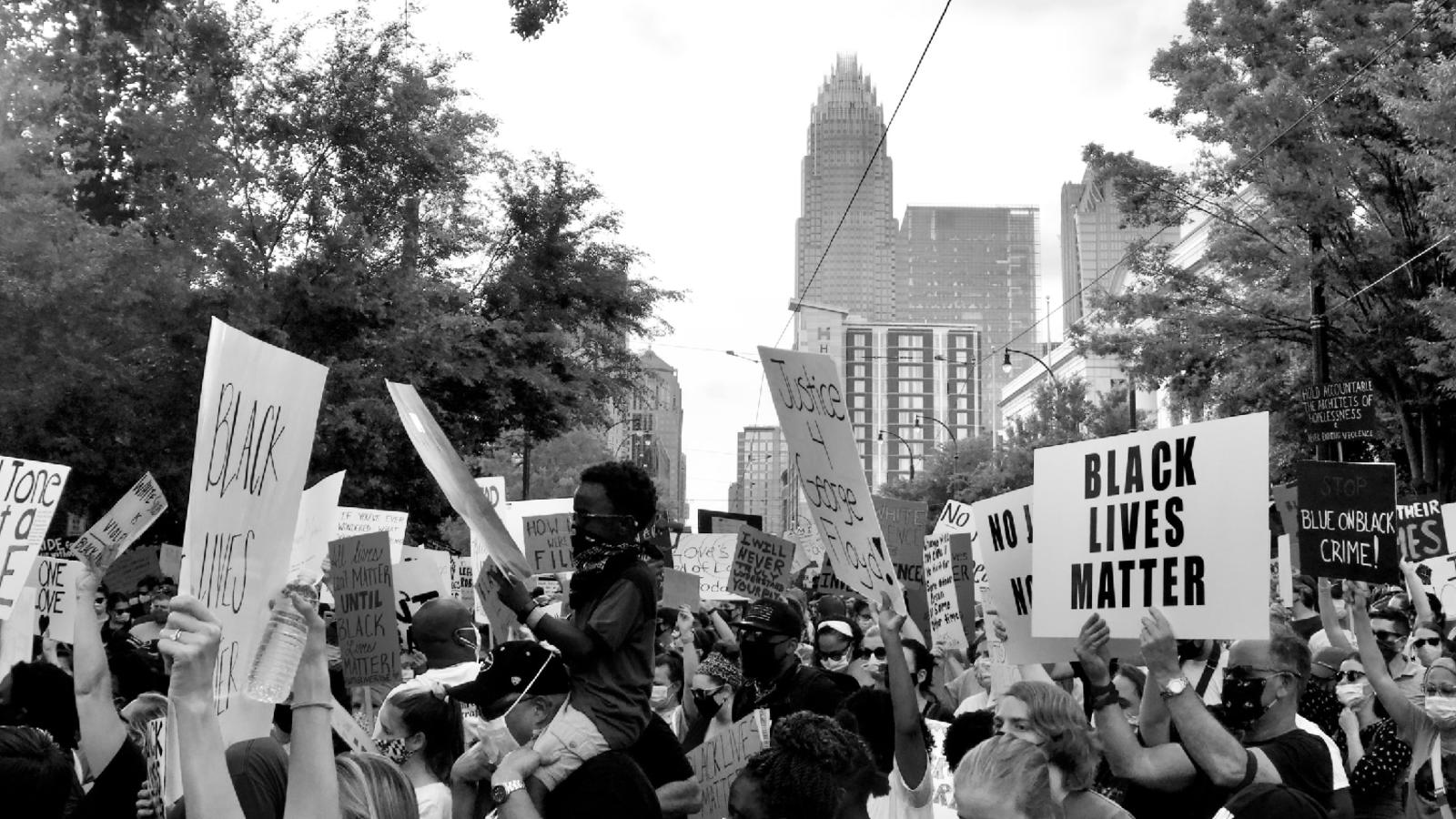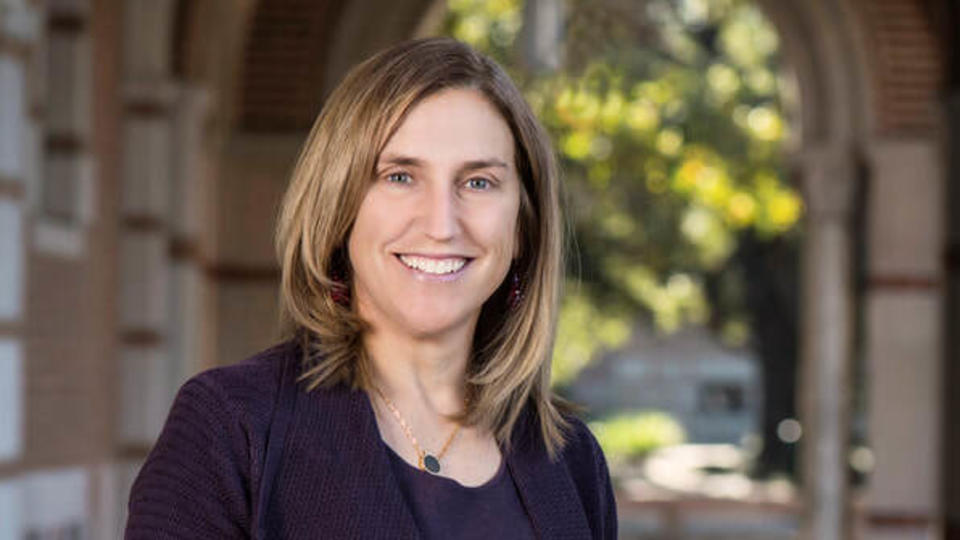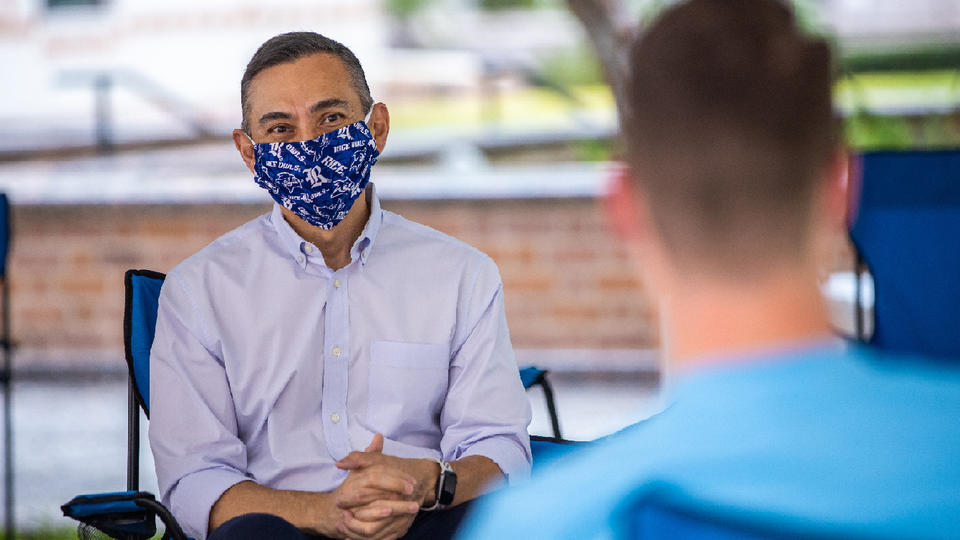Bending Toward Justice

The tragic deaths of Black Americans at the hands of white police officers have forced a reckoning in American institutions. Rice Business is asking: How do we answer the call to improve our world and address systemic racism and oppression?
Horror. Disbelief. Anger.
Those were just a few of the emotions that rippled through the Rice Business community in response to the May killing of George Floyd, a 46-year-old unarmed Black man, at the hands of white police officers in Minneapolis — an event that led to mass protests across the country. Amongst people of color, there was also the bone-deep weariness that comes from yet another stark reminder of the injustice that pervades American society.
“It’s been one of the most exhausting, emotionally draining times in my life,” says Valerie Valentine ’21.
Valentine, who is president of the Black Business Student Association, lost her father in the fall. She has not set foot in McNair Hall since spring break, when the school moved to remote learning in response to the COVID-19 pandemic. And she admits that having to process what Floyd’s death means for her as a Black woman — figuring out how to respond and where to focus her energies — while simultaneously navigating the challenges of life during a global pandemic has at times been overwhelming.
But if there is fatigue, there is also hope. Hope that administrators and faculty, students and alumni can seize this moment to achieve real and lasting change on campus and beyond.
It’s heartbreaking, but what I feel right now is momentum. We need to move now.
Nalani Ortiz ’21
Shortly after Floyd’s death, Dean Peter Rodriguez established the Rice Business Task Force on Racial Equity and Social Justice. Meanwhile, the Jones Student Association launched a GoFundMe campaign that has so far raised more than $12,000 for Houston-area nonprofits such as Black Lives Matter Houston and the Black Trans Advocacy Coalition.
In ways both large and small, the entire community redoubled its efforts to confront and repair the injustice and inequality that have dogged this country for far too long.
“It’s heartbreaking,” Nalani Ortiz ’21, says of the recent killings, which include not only the death of George Floyd but also those of Ahmaud Arbery in February and Breonna Taylor in March. “But what I feel right now is momentum. We need to move now.”
Doing More
By many measures, Rice Business has been moving on issues of racial equity and social justice for some time.
When he arrived on campus in 2016, Rice Business Dean Peter Rodriguez supported and expanded the position of Director of Diversity and Inclusion. He also successfully petitioned to have Rice Business join the Consortium for Graduate Study in Management, an alliance of top-tier business schools and corporate partners dedicated to increasing minority representation in business education and corporate leadership. Member schools must demonstrate a significant commitment to diversity and inclusion, not least through scholarships to students who do the same.
“It’s been a game-changer in terms of attracting students,” says Lina Bell, who has been Director of Diversity and Inclusion since 2017.
Valentine and Ortiz are both Consortium Fellows; Ortiz serves as the Rice Business chapter president. Michael Arnold ’21, the diversity and inclusion chair for the Jones Student Association, is also a Consortium Fellow. And all three are members of the Task Force on Racial Equity and Social Justice, where Valentine serves as student co-chair.
The school partners with various organizations that work to increase the number of women and underrepresented minority MBAs. It actively recruits from as broad a range of communities as possible. And administrators, staff and students organize events that bring together alumni, Houston-area business leaders, and groups such as Out & Allied, the school’s LGBTQ organization, and the Forté Foundation, which aims to give women greater access to business education and professional development.
Those efforts have helped make Rice Business one of the most diverse business schools in the United States. According to Bell, the number of underrepresented minorities on campus increased from 10 percent to nearly 20 percent between 2017 and 2019. That same year, Poets & Quants magazine recognized Rice Business as having the highest proportion of minority MBA students of any top-25 business school in the country.
In the wake of George Floyd’s death and the ensuing protests, Bell quickly organized a series of workshops for staff on topics such as bias and systemic racism. Rodriguez created the task force, which is charged with recommending specific actions to promote racial equity and social justice. Yet everyone agrees that much work remains to be done.
Minority students, for instance, cannot help but notice that neither the faculty nor the curriculum reflect the diversity of the student body.
“I don’t think students see themselves in the faculty. I know I don’t,” says Arnold, who can trace his family roots to Nicaragua, Cuba and Puerto Rico.
What’s more, they lament the limited number of business cases that feature women and underrepresented minorities as protagonists.
“We read hundreds of cases in our first year, and none of them reflect our experiences,” Valentine says.
And while bias and inequity are sometimes discussed in the classroom in abstract terms, more difficult conversations about racial equity and social justice are few and far between.
“I can’t think of a single class where I’ve had a facilitated dialogue around race, equity, privilege and inclusion,” says Ortiz, who like Valentine identifies as a Black woman. “I really want to know where my classmates stand on these issues. But if we never get to voice our concerns or thoughts with each other, then what we are left with is assumptions. And assumptions can be so damaging.”
Rodriguez agrees. “We haven’t done enough to increase the diversity of the faculty and of the groups of people who work in the building. And we haven’t done enough to infuse the curriculum with thoughtful training on what race, ethnicity, sexuality, and everything else that creates differences amongst people tends to do to the way they think of each other and how they behave in groups and in society,” he says, adding that doing so is critical to the school’s mission of producing ethical leaders who can build efficient organizations.
Diversifying the Faculty
Making progress on these fronts will require an innovative mindset and a willingness to play both a short game and a long one. Fortunately, those are the specialties of the house.
The relative lack of faculty diversity, for instance, is a reflection of a larger problem that afflicts all top-tier business schools, and addressing it in a comprehensive way — i.e., increasing the number of underrepresented minority PhD candidates and ensuring that they have a level playing field in terms of career advancement — will take time.
The school already participates in the PhD Project, an initiative that helps Black, Latinx, and Native American students earn doctorates in business. But as Rodriguez points out, the current gap in faculty representation is so large that the PhD Project could triple its numbers and still not fill it.
“There’s no short-run solution to that part of the problem,” he says.
There are, however, a number of things that Rice Business can do to improve the situation in the short term while addressing the larger problem over the long haul.
For instance, the school can expand its own PhD programs and work harder to identify talent at state schools and historically Black colleges and universities. It can reconsider the merits on which promotion and tenure are decided, looking beyond the handful of journals that currently serve as the arbiters of quality scholarship. It can invite experts who are not traditional academics to do more classroom teaching. And it may even be able to make explicit calls to hire underrepresented minorities for specific positions — though that last piece, Rodriguez admits, may present legal issues.
If the specific details still need to be ironed out, the path forward is clear.
“We have to look outside the traditional pipeline to do better sooner,” Rodriguez says. “And we have to commit to being part of the long-term solution.”
Changing the Conversation
The same basic principle applies to curricular reform. On one hand, Rice Business can encourage faculty to engage more directly in conversations around equity, bias and social justice — a task for which Ortiz, herself a former teacher, argues they are uniquely well-suited.
“Educators are taught to be facilitators of dialogue,” she says. “By avoiding those conversations, we’re really not leveraging what our faculty are capable of.”
At the same time, says Rodriguez, Rice Business can devote more resources to attracting scholars whose own research addresses questions of equity and social justice; creating symposia and other platforms for discussing race and bias; and supporting students who have their own ideas for raising those issues on campus.
It can also do more to redress the lack of business cases that feature women and people of color. Faculty members could choose cases with a more diverse cast of characters, Rodriguez says. In addition, they could augment the formal cases they use with examples of their own choosing that feature historically underrepresented groups.
Not doing these things, he contends, adversely affects the underrepresented students in the room “by putting them at a greater distance from the protagonists in their choices — or by suggesting that they could not be leaders.”
A Force for Change
All of these changes fall within the purview of the task force, whose creation in early June was initially met with a certain amount of skepticism by students. At the time, some worried that it would move too slowly — or worse, that it was meant to quell their concerns without taking meaningful action.
“A lot of us were like, ‘Why do we have to wait for a task force?’” recalls Arnold.
Those fears were laid to rest by the composition of the group, which includes a diverse mix of students, alumni, faculty and staff, and by its timeline: While he has made clear that anyone can present him with a request at any time, Rodriguez has asked the task force to present its preliminary recommendations to him no later than October 2 and its final recommendations no later than December 18.
“I do feel as if the school is listening,” says Ortiz.
Yet the task force is only one vehicle for change. Bell, for example, would like to find ways of increasing collaboration with other units within the university that do work related to diversity and inclusion, such as the Baker Institute for Public Policy and the Center for African and African American Studies. Student members of the task force have already reached out to deans and faculty members to explore their own ideas for addressing themes of bias and representation, equity and injustice. And Arnold has been mulling future JSA initiatives.
It’s too early to tell exactly what will come of all this activity. But one thing is certain: The results will reverberate well beyond McNair Hall.
“What we instill in our student body will ultimately radiate into all of the different businesses that students will have their hands in,” says Ortiz. “If they learn to release their assumptions and judgments about people, they’ll know how to check their biases, or at least be aware of them.”
That applies not only to race, says Rodriguez, but to gender, sexuality, and all the other elements of the human experience that make for diverse and inclusive organizations.
“We all know that the greatest impact that we have on society tends to be through the decisions that our students make, how they see the world and how they choose to lead,” he says. “We’re just one school. I know we can’t do it all. But the right people can make a big difference.”
Alexander Gelfand is a freelance writer based in New York City who often covers business, science and social justice.


